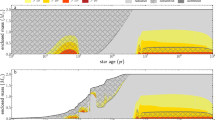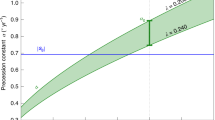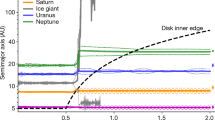Abstract
THE criticisms of Alfven's theory1 of the origin of the solar system contained in Lieut.-Colonel Edgeworth's letter2 seem to be based on a summary of the theory given by its author in an earlier letter3. This summary was clearly designed to illustrate the application of the theory to the newly discovered non-solar planetary systems, and it did not bring out what is perhaps the most attractive feature of the theory, namely, that it explains why a large part of the angular momentum of the solar system resides in the outer planets.
This is a preview of subscription content, access via your institution
Access options
Subscribe to this journal
Receive 51 print issues and online access
$199.00 per year
only $3.90 per issue
Buy this article
- Purchase on Springer Link
- Instant access to full article PDF
Prices may be subject to local taxes which are calculated during checkout
Similar content being viewed by others
References
Alfvén, H., Stockholms Obs. Ann., 14, No. 2 (1942).
NATURE, 153, 140 (1944).
NATURE, 152, 721 (1943).
Ark. Mat. Astr. Fys., 28 A, No. 6 (1942).
Author information
Authors and Affiliations
Rights and permissions
About this article
Cite this article
HUNTER, A. Origin of the Solar System. Nature 153, 255–256 (1944). https://doi.org/10.1038/153255c0
Issue Date:
DOI: https://doi.org/10.1038/153255c0
Comments
By submitting a comment you agree to abide by our Terms and Community Guidelines. If you find something abusive or that does not comply with our terms or guidelines please flag it as inappropriate.



